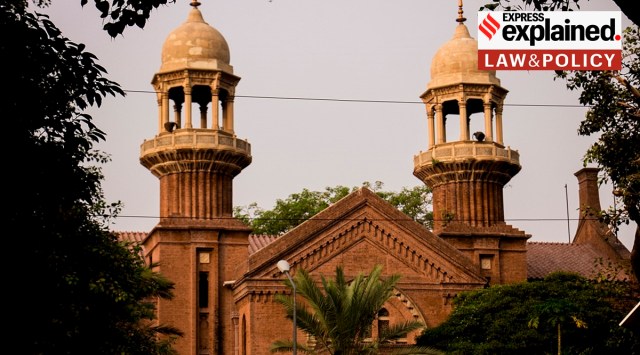- India
- International
Lahore High Court strikes down Pakistan’s ‘sedition law’: The law, the case and India parallels
A product of India and Pakistan's colonial rule, the 'sedition law' has always been contentious on account of how it can be used to curb dissent.
 Justice Shahid Karim of the Lahore High Court, struck down Section 124A of the PPC, in response to a batch of petitions seeking to declare the provision as unconstitutional or “ultra vires” the fundamental rights enshrined in the Constitution under Article 9, 14, 15, 16, 17, 19 and 19A.(Wikimedia Commons)
Justice Shahid Karim of the Lahore High Court, struck down Section 124A of the PPC, in response to a batch of petitions seeking to declare the provision as unconstitutional or “ultra vires” the fundamental rights enshrined in the Constitution under Article 9, 14, 15, 16, 17, 19 and 19A.(Wikimedia Commons) The Lahore High Court Thursday invalidated the provisions of Section 124A of the Pakistan Penal Code, also referred to as its “sedition law”. Section 124A made it a crime to engage in sedition or “disaffection” against the government.
Justice Shahid Karim of the Lahore High Court, struck down Section 124A of the PPC, in response to a batch of petitions seeking to declare the provision as unconstitutional or “ultra vires” the fundamental rights enshrined in the Constitution under Article 9, 14, 15, 16, 17, 19 and 19A.
What is Pakistan’s sedition law?
Section 124A of Pakistan’s Penal Code defines “sedition” as, “Whoever by words, either spoken or written, or by signs, or by visible representation, or otherwise, brings or attempts to bring into hatred or contempt, or excites or attempts to excite disaffection towards, the Federal or Provincial Government established by law shall be punished with imprisonment for life to which fine may be added, or with imprisonment which may extend to three years, to which fine may be added, or with fine.”
What happened in the present case?
A single judge bench of Justice Shahid Karim of the Lahore High Court, after hearing a batch of similar petitions seeking to annul the sedition law, declared it null and void, holding it to be in contravention of Pakistan’s Constitution, reported Dawn.
The pleas challenging Section 124A argued that the Constitution accords the right to freedom of speech and expression to every citizen. However, the colonial statute of sedition punishes free speech critical of the government with life imprisonment.

One of the pleas was filed by a citizen named Haroon Farooq, who argued that Section 124A of the PPC is “ultra vires in terms of Article 8 of the Constitution being inconsistent with and in derogation of fundamental rights provided under Article 9, 14, 15, 16, 17 and 19, 19A of the Constitution.”
Arguing that the sedition law was being used “recklessly” as a tool of exploitation to curb the right to free speech provided under Article 19 of the Constitution, the plea contended the same to be an “illegitimate limitation” on various other constitutional freedoms. It also mentioned how journalists, politicians, and activists were increasingly being booked under this provision for criticising the government or its agencies, citing examples of journalists like Javed Hashmi, who was sentenced to 23 years in prison for the crime of sedition.
Where does India stand on the sedition law?
A product of the subcontinent’s colonial rule, the sedition law was inherited by the penal systems of both India and Pakistan, and is identical in the two counties. This provision was extensively used to curb political dissent during India’s anti-colonial struggle. Several pre-independence cases involving Section 124A of the IPC are against celebrated freedom fighters, including Bal Gangadhar Tilak, Annie Besant, Shaukat and Mohammad Ali, Maulana Azad, and Mahatma Gandhi.
Pakistan’s Penal Code enshrines it under Section 124A, much like the Indian Penal Code (IPC) which defines it under Section 124A as well.
In May 2022, a three-judge bench headed by the then CJI NV Ramana of the Apex Court in “S.G. Vombatkere vs Union Of India” directed the Centre and states to keep in abeyance all pending trials, appeals, and proceedings with respect to the charge framed under Section 124A of the Indian Penal Code (IPC), which deals with the offense of sedition, till the central government completes the promised exercise to reconsider and re-examine the provision.
The central government had initially defended the colonial provision, but later told the Apex court it was reviewing it. Almost a year later, a determinate conclusion is still awaited.
More Explained
EXPRESS OPINION
May 03: Latest News
- 01
- 02
- 03
- 04
- 05







































